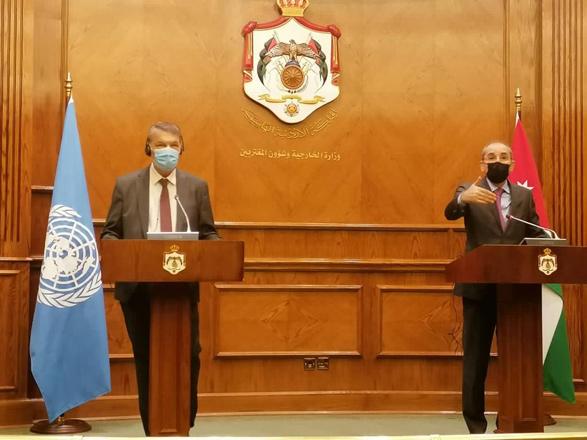- Local News
- Sun-2020-12-13 | 02:54 pm

Deputy Prime Minister and Foreign Minister Ayman Safadi on Saturday reiterated that there will be "no alternative to UNRWA and no renunciation of its mandate”, stressing that the agency has been established under an international mandate and must continue its operations until a just solution to the refugees’ issue is reached.
Safadi’s remarks came during his meeting with Commissioner-General of the United Nations Relief and Works Agency for Palestine Refugees (UNRWA) Philippe Lazzarini, held for rallying support for the agency.
The foreign minister highlighted the importance of ensuring financial support for the agency in order for it to continue providing vital services, especially in light of the pandemic, according to a Foreign Ministry statement.
During the meeting, the two sides discussed international partners’ efforts and consultations towards supporting UNRWA and rallying financial support to bridge the agency's deficit.
Talks also went over preparations for the joint working group meeting, which will be organised by the Kingdom and Sweden during the first quarter of the next year, to discuss financial and political support to the agency with international partners.
In joint press remarks that followed the meeting, Safadi said: "As we have repeatedly said, there is no alternative to UNRWA, no renunciation of its mandate and no acceptance of any proposal that minimises the agency’s ability”, highlighting the "unacceptable” political and humanitarian consequences of such a move.
Talks focused on two parts, the first dealt with addressing the current financial crises that the agency is experiencing, while the second focused on finding sustainable support mechanisms, Safadi said, noting that the strategic dialogues held by the Stockholm Group are considering these measures.
Safadi stressed the importance of continuing support to the agency to enable it to continue playing its UN-mandated role, in accordance with relevant UN resolutions, within the context of a comprehensive solution to the conflict, on the basis of the two-state solution.
The situation is "very dangerous” for the refugees who rely on the agency, notably those who need medical treatment, food, as well as children who need to go to schools, he added.
Safadi also commended the Commissioner-General teams’ efforts towards supporting the agency.
Lazzarini lauded the Kingdom’s continuous efforts towards rallying political and financial support to the agency. Stressing that UNRWA’s financial situation is critical, he called for urgent financial support.
UNRWA is currently experiencing an "unprecedented” financial deficit, he said, highlighting the increased needs amid several regional crises, notably the COVID-19 pandemic and its health and economic consequences, which resulted in increasing the rate of absolute poverty and consequently growing reliance on the agency’s services.
Next year’s conference is aimed at strengthening the international community’s commitment and ensuring better sharing of responsibility towards the agency’s activities, he said, stressing that there is a mandate and "no change will take place until reaching an appropriate political agreement”, one that promotes a lasting and just solution in the region.
The two sides agreed to continue consultation and coordination over means of rallying support to the agency to enable it to continue playing its UN-mandated role.









